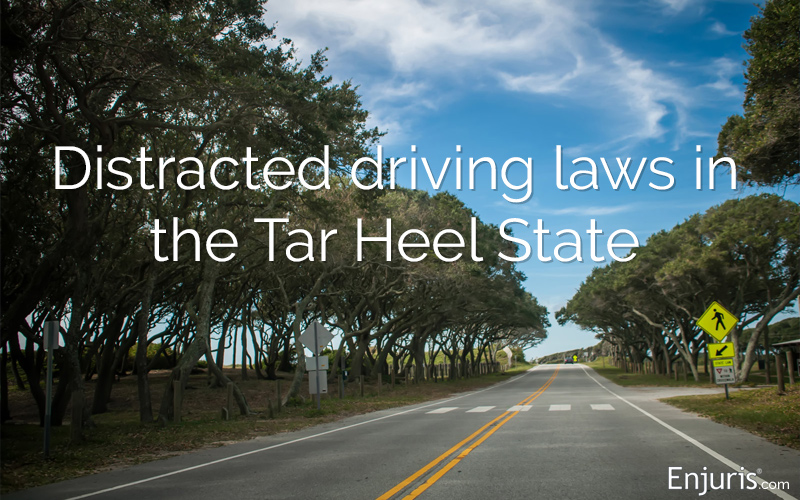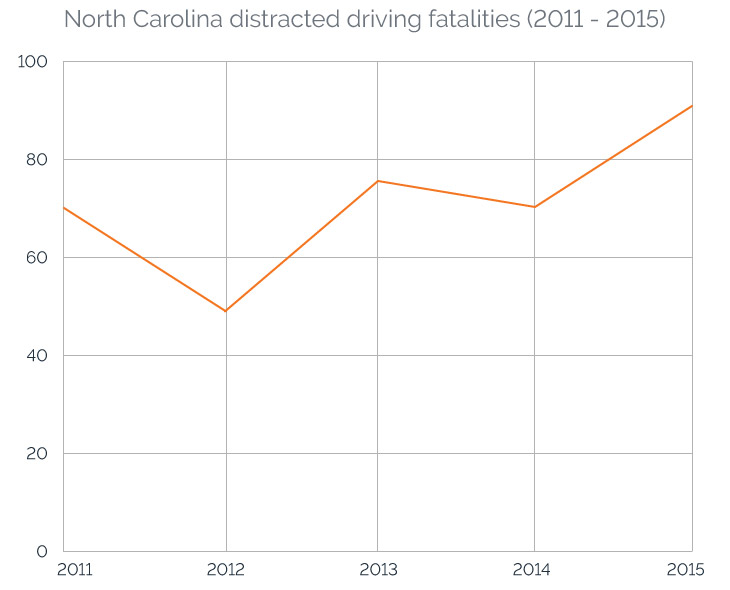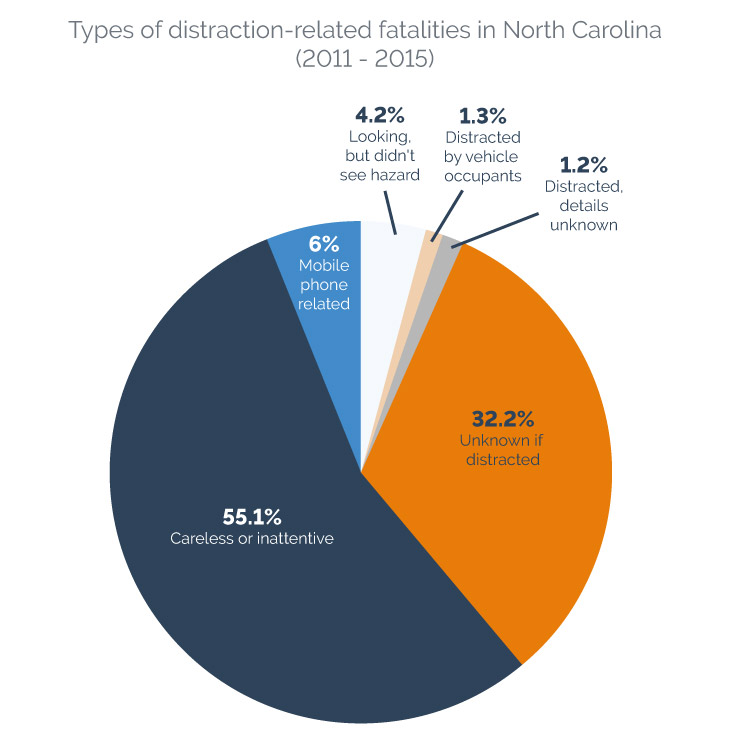
How you can do your part to keep yourself and those around you safer by avoiding distraction behind the wheel
Distracted driving is a big problem in North Carolina. From the Outer Banks to the Appalachian Mountains, people across the state often make the mistake of not making driving their number one priority when behind the wheel.
This problem isn’t just restricted to the Tar Heel State though.
There are 21 states that prohibit all drivers from using hand-held mobile phones while driving. Forty-eight states ban text messaging for all drivers.
Distracted driving isn’t just about mobile phones, though.
What is distracted driving?
Distracted driving is any action that meets one of these 3 criteria:
- Anything that takes your eyes off the road (visual distraction)
- Anything that takes your hands off the wheel (manual distraction)
- Anything that takes your mind’s focus off the task of driving (cognitive distraction)
Examples of distracted driving behavior could include (but isn’t limited to):
- Eating
- Adjusting dashboard controls like the temperature or radio
- Reaching for an item on the passenger seat or floor
- Paying attention to a passenger in the back seat
- Observing a distracting scene outside the vehicle
- Personal grooming like shaving or applying makeup
- Reading directions
- Using an electronic device or GPS
How big a problem is distracted driving?
Anyone who drives a car, rides as a passenger, or uses the roads as a bicyclist or pedestrian should be concerned about distracted drivers. Fortune describes distracted driving as an “epidemic” in the U.S.
An insurance company survey conducted a few years ago asked 2,300 drivers about their driving habits. Ninety-six percent of respondents said that they believe they’re safe drivers, but more than half of those people (56 percent) admitted that they’d used their phone while driving.
Data from the company’s app, which can track users’ phone use, indicated that 96 percent of drivers used their phones at least once a month while driving, and that most drivers average 1 call per trip. However, the app cannot track a conversation on speakerphone or Bluetooth (because the user doesn’t pick up the handset). This means the recorded usage was either texting or hand-held conversations, which suggests that the actual amount of time spent on phones is likely even higher than what’s reflected by this data.
North Carolina distracted driving statistics
The National Highway Traffic Safety Administration (NHTSA) reported that 3,166 people were killed by distracted drivers in 2017, the most recent year for which data is available.
- Nine percent of all traffic-related fatalities in 2017 were caused by distracted drivers.
- The 15- to 19-year-old age group has the highest proportion of distracted drivers in fatal crashes
- There were 599 pedestrians and bicyclists (i.e. non-occupants of cars) killed in distracted driving crashes in 2017.
Source: NHTSA Traffic Safety Facts
The NHTSA Fatality Analysis Reporting System (FARS) reported that there were 93 fatalities in North Carolina in 2018 attributed to the driver being distracted at the time of the crash. These distraction-related crashes were 8 percent of all North Carolina traffic fatalities.

More than 80% of these fatalities during this time period were attributed to carelessness or inattentiveness, and only 8.7% were attributed to mobile phones.
The NHTSA provides this data for North Carolina distracted driving fatalities from 2011-2015:

Source: North Carolina Governor’s Highway Safety Program FY2018 Highway Safety Plan
These figures represent fatalities, meaning an accident where a person (or more than one person) died. There are far more crashes where people survive and the injuries can be devastating.
In fact, of the 275,067 total North Carolina car crashes in 2017, 54,133 (almost 20%) were because of distracted driving.
Tweet this
The NHTSA has said that sending or reading a single text takes an average of 5 seconds. In those 5 seconds, a person driving 55 miles per hour can travel the entire length of a football field. In essence, you’ve driven the length of that football field with your eyes closed.
Is that a risk you want to take?
Probably not.
And yet lots of people do. Although officials continue to promote distracted driving awareness campaigns, it continues to be a problem.
North Carolina distracted driving laws
North Carolina allows talking on a mobile phone while driving, but the law does prohibit texting and emailing when behind the wheel.
North Carolina doesn’t ban hand-held mobile phones for all drivers, but the devices are banned for school bus drivers and drivers under 18 (also called “Novice Drivers”). All drivers are prohibited from texting while driving in North Carolina.
North Carolina law allows primary enforcement of distracted driving laws. Primary enforcement means an officer may pull you over and issue a ticket if you’re violating a distracted driving law even without any other traffic infraction. Secondary enforcement would mean you could only be ticketed for distracted driving if you were breaking another law at the time.
North Carolina distracted driving penalties
Under current law, distracted driving penalties in North Carolina are:
- $100 for texting or emailing while driving
- $25 for a driver under 18 years old using a mobile phone
- $100 for using a mobile phone while driving a school bus
Are there exceptions to North Carolina’s texting driving law?
Texting is permitted in North Carolina only when:
- The driver is lawfully parked or stopped
- The driver is a police officer or other emergency responder who must text as part of their official duties
- The driver is using a voice-to-text application or technology
10 safe driving tips to avoid distracted driving
We’ve talked a lot about how you can be affected by someone else’s distracted driving, but there are also things you can do to make sure that you are not distracted behind the wheel. Here are some actionable tips to avoid causing a distracted driving accident:
- Never hold your phone in your hand. If you need to use it for GPS, mount it to the dashboard so you can see the map without taking your eyes off the road. Turn off other notifications so that you’re not seeing other banners or pop-up notifications on the map while driving.
- Silence your phone before getting in the car.
- It’s not just about texting — don’t use any apps or social media while driving. If you need to send a text or look at something, pull over where it’s safe to do so. If you can’t resist looking at your phone when it buzzes, keep it somewhere you can’t get to it like in the back seat or trunk — that way you’re not tempted to sneak a peek. Some phones now have a Do Not Disturb While Driving function. If yours has this capability, consider equipping it.
- Keep your music or other listening material at a low enough volume that you can hear sounds outside the car.
- Don’t text or call someone if you know they’re likely to be driving.
- Don’t eat or drink while driving.
- If you listen to music or podcasts from your phone while driving, queue your selections before you start driving so you don’t have to touch your phone while behind the wheel.
- Don’t allow your passengers to be a distraction. Keep pets in a carrier.
- If you drop something on the floor of the car, either leave it there until you’ve reached your destination or pull over to retrieve it.
- Regardless of what’s happening outside the car, don’t use your phone to take videos while driving. If you feel like recording traffic is useful, purchase a separate dashcam that can record without driver intervention.
North Carolina personal injury lawsuits related to distracted driving
There must be clear evidence of negligence after an accident in order to receive a settlement or award in North Carolina. In other words, if you were injured in a North Carolina car accident, the claim will settle in your favor only if the other driver was 100% negligent (at fault for the accident).
An addition to distracted driving, a driver can be negligent in a variety of ways:
- Unsafe lane change, or pulling into traffic without looking carefully
- Speeding or aggressive driving
- Following too closely (i.e. tailgating)
- Failure to yield right of way
- Failure to follow a stop sign, red light, or another signal
Types of distracted driving accident damages
In a personal injury claim, the plaintiff is often awarded compensatory damages. Compensatory damages are intended to restore you (the plaintiff) to the condition you’d be in if the accident had never happened.
You can recover these compensatory damages after a North Carolina car accident:
- Costs for medical treatment, both current and future
- Lost wages and earning capacity, current and future
- Ongoing therapies and adaptive devices
- Assistance with costs of daily living (housekeeping, home aides, etc. if you’re disabled as a result of the accident)
- Property loss (cost of vehicle repair or replacement)
- Pain and suffering and other emotional distress
- Other expenses related to the accident
If the driver is found to be grossly negligent, the court might award punitive damages in addition to the regular damages that are awarded to cover your medical and other costs from an accident. Punitive damages are awarded when the defendant’s behavior is so egregious or malicious that the court determines that it warrants punishment.
If the court awards punitive damages, this amount is capped at 3 times the amount of the compensatory damages. These damages might be awarded if the defendant is found to be grossly negligent. Gross negligence could include drag racing, road rage, distracted driving, or drunk driving.
Do you need a lawyer after a North Carolina distracted driving accident?
North Carolina law is complicated because it has a pure contributory negligence standard. In some respects, this makes the legal process less friendly to plaintiffs compared to other states’ laws. There are very limited exceptions to pure contributory negligence.
One exception is gross negligence. If you’re the plaintiff in a car accident where another driver was distracted, you still might not be able to recover damages if you had any amount of liability, no matter how small. This could mean that the court determines you could’ve braked a moment sooner, been more alert to the possibility of a crash... anything.
Distracted driving can also be difficult to prove. Phone records might show if a person was actually sending a text at the time of the crash, but they can’t show if the driver was reading a text or using their phone in some other way. And remember — using a phone for a spoken conversation isn’t illegal in North Carolina. So if phone records show that the device was engaged in a call, that might not affect your claim.
For all of these reasons, a lawyer is typically your best bet for attempting to recover damages. Most personal injury lawyers offer a free initial consultation, which means they’ll meet with you in person to review the facts of your case and advise about your best strategy for success. They’ll also tell you whether they think you have a case and what they can do for you.
The Enjuris law firm directory is a great source for finding a North Carolina car accident lawyer near you who has experience, knows local and state laws, and can help you get the compensation you need after your accident.
See our guide Choosing a personal injury attorney.
